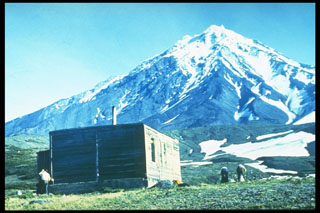Report on Koryaksky (Russia) — 19 August-25 August 2009
Smithsonian Institution / US Geological Survey
Weekly Volcanic Activity Report, 19 August-25 August 2009
Managing Editor: Sally Sennert.
Please cite this report as:
Global Volcanism Program, 2009. Report on Koryaksky (Russia) (Sennert, S, ed.). Weekly Volcanic Activity Report, 19 August-25 August 2009. Smithsonian Institution and US Geological Survey.
Koryaksky
Russia
53.321°N, 158.712°E; summit elev. 3430 m
All times are local (unless otherwise noted)
KVERT reported that during 14-21 August seismic activity from Koryaksky was slightly above background levels. During 13-16 August, gas-and-steam plumes rose to altitudes of 3.5-5 km (11,500-16,400 ft) a.s.l. Based on visual observations during 16-20 August, gas-and-steam plumes containing ash rose to altitudes of 3.5-4.2 km (11,500-13,800 ft) a.s.l. and drifted in multiple directions. Ash plumes were also seen in satellite imagery, drifting 215 km E and W. On 23 August, a probable ash plume detected in satellite imagery drifted 50 km ESE. During 24-25 August, seismicity increased; more than 100 earthquakes were recorded. The Level of Concern Color Code remained at Orange.
Geological Summary. The large symmetrical Koryaksky stratovolcano is the most prominent landmark of the NW-trending Avachinskaya volcano group, which towers above Kamchatka's largest city, Petropavlovsk. Erosion has produced a ribbed surface on the eastern flanks of the 3430-m-high volcano; the youngest lava flows are found on the upper W flank and below SE-flank cinder cones. Extensive Holocene lava fields on the western flank were primarily fed by summit vents; those on the SW flank originated from flank vents. Lahars associated with a period of lava effusion from south- and SW-flank fissure vents about 3900-3500 years ago reached Avacha Bay. Only a few moderate explosive eruptions have occurred during historical time, but no strong explosive eruptions have been documented during the Holocene. Koryaksky's first historical eruption, in 1895, also produced a lava flow.

